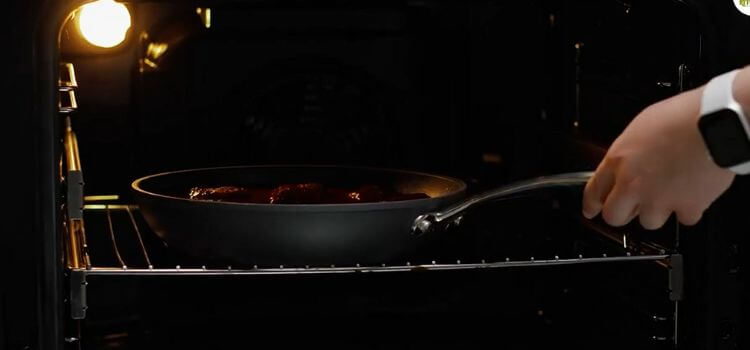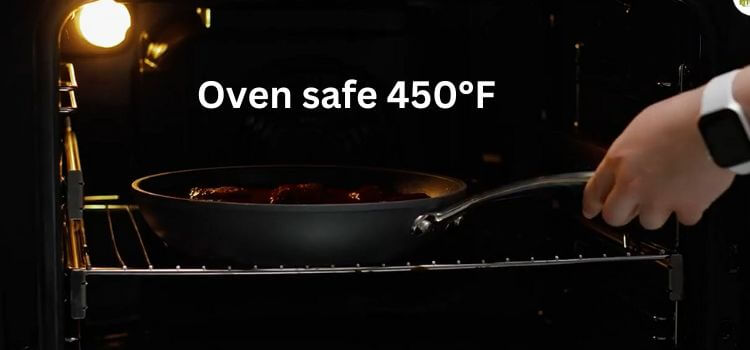As an Amazon Associate I earn from qualifying purchases
Yes, aluminum pans are safe to put in the oven. Aluminum pans are oven-safe and can withstand high temperatures without melting or warping.
Introducing convenience and versatility to our cooking routines, aluminum pans have become a staple in many kitchens. Are you wondering if it’s safe to use them in the oven as well?
The answer is yes! Aluminum pans are oven-safe and can handle high temperatures without melting or warping issues.
So, whether baking a delicious casserole or roasting vegetables, rest assured that your aluminum pan is up to the task. We will explore the reasons behind the oven-safe nature of aluminum pans and address common concerns about using them in the oven.
So, let’s dive in and uncover the secrets of cooking with aluminum pans in the oven.

Aluminum Pans In The Oven
Aluminum pans are a common choice for baking and roasting due to their lightweight nature and excellent heat conductivity. They are a convenient and cost-effective option for home cooks and professional chefs alike.
However, before you pop that aluminum pan into the oven, it’s important to understand the potential risks and limitations.
In this article, we will explore the material safety of aluminum pans and the maximum temperature limits you should be aware of.
Material Safety
Aluminum is a popular material for cookware due to its high thermal conductivity, which ensures that heat is distributed evenly across the pan. It is lightweight, affordable, and corrosion resistant. These qualities make aluminum pans a preferred choice for many cooking enthusiasts.
However, there has been some concern about the potential health effects of using aluminum cookware, particularly when it comes to acidic foods and high temperatures. Aluminum can react with certain ingredients, causing them to leach into the food.
While the research surrounding the health risks of aluminum cookware is inconclusive, it’s best to take precautions to minimize any potential exposure.
To ensure the safe use of aluminum pans in the oven, consider the following:
- Avoid using aluminum pans for cooking highly acidic foods like tomatoes, citrus fruits, and vinegar-based dishes.
- Line the pan with parchment paper or use a silicone baking mat to create a barrier between the food and the pan.
- Avoid using aluminum pans with heavily scratched or damaged surfaces, as this can increase the risk of aluminum leaching into the food.
- Do not store acidic or salty dishes in aluminum pans, as prolonged contact can cause leaching.
By following these guidelines, you can minimize any potential health risks associated with aluminum cookware and continue enjoying its convenience.
Maximum Temperature Limits
While aluminum pans are generally safe to use in the oven, it’s crucial to be aware of their maximum temperature limits. Exposing aluminum pans to excessively high temperatures can cause them to warp, melt, or even release toxic fumes.
To prevent any mishaps, refer to the manufacturer’s instructions for your specific pan. Generally, most aluminum pans can withstand temperatures up to 450°F (232°C).

If you need to cook at higher temperatures, it’s best to use alternative cookware materials like stainless steel or cast iron. These materials are more suitable for high-heat cooking and can handle extreme temperatures without issues.
By understanding the material safety of aluminum pans and their maximum temperature limits, you can make informed decisions when it comes to using them in the oven.
Following proper usage guidelines will ensure a safe and delicious cooking experience.
Advantages Of Aluminum Pans
Let’s explore the advantages of using aluminum pans.

Heat Conductivity
One of the key advantages of aluminum pans is their exceptional heat conductivity. Aluminum is known for distributing heat evenly throughout the pan, ensuring that your food cooks or bakes evenly.
This heat conductivity is especially beneficial when baking cakes and cookies, where even heat distribution is crucial for a perfect, golden-brown finish.
Affordability
Another advantage of aluminum pans is their affordability. Aluminum is a widely available and relatively inexpensive metal, making aluminum pans a budget-friendly option for any kitchen. Whether you’re a professional chef or a home cook, you can enjoy the benefits of aluminum pans without breaking the bank.
Disadvantages Of Aluminum Pans
Reactivity With Acidic Foods
Aluminum pans tend to react with acidic foods, leading to a metallic taste and discoloration of the food. This can also cause the pan to deteriorate, impacting its longevity.
Durability Concerns
Due to its relatively soft nature, aluminum pans are more susceptible to dents, dings, and warping, especially when subjected to high temperatures. This can compromise their durability and overall lifespan, requiring more frequent replacements.
Safety Tips For Using Aluminum Pans In The Oven
Aluminum pans are a convenient choice for baking and roasting in the oven, but it’s essential to follow safety guidelines to prevent accidents and maintain the quality of your cookware.
Avoiding Abrasive Cleaners
Avoid using abrasive cleaners on your aluminum pans as they can scratch the surface and reduce their lifespan.
- Clean using a gentle detergent and a soft sponge.
- Never use steel wool or harsh scrubbing pads.
- Rinse very well and dry absolutely to save you water stains.
Using Proper Oven Mitts
Always use oven mitts when handling aluminum pans in the oven to prevent burns or injuries.
- Choose heat-resistant oven mitts that cover your hands and wrists fully.
- Avoid using thin kitchen towels or cloths that can easily catch fire.
- Handle hot pans with care to avoid accidental spills or drops.
Best Practices For Baking With Aluminum Pans
Baking with aluminum pans is a convenient option that many home cooks and bakers use for various recipes. However, it’s essential to understand the best practices for using aluminum pans in the oven to ensure successful results.
Below, we’ll discuss proper greasing, adjusting baking times, and other important tips for baking with aluminum pans.
Proper Greasing
When using aluminum pans for baking, it’s crucial to properly grease the pan to prevent sticking and ensure easy removal of the baked goods. Use a cooking spray or brush the pan with a thin layer of vegetable oil before adding the batter or dough to the pan.
This simple step will help maintain the shape of your baked goods and make clean-up a breeze.
Adjusting Baking Times
Since aluminum pans conduct heat differently than other materials, it’s important to adjust the baking times accordingly. Keep an eye on your baked goods, and if you notice that they are browning too quickly or not cooking evenly, consider lowering the oven temperature slightly and extending the baking time. This will help you achieve perfectly baked treats with a consistent texture.
Expert Opinions On Aluminum Pans In The Oven
There are many opinions among culinary professionals and baking enthusiasts about using aluminum pans in the oven.Let’s see what experts have to say on this topic.
Culinary Professionals
Culinary professionals, including chefs and experienced cooks, have differing opinions on using aluminum pans in the oven. While some feel that aluminum pans are a convenient choice due to their lightweight nature and excellent heat conductivity, others have reservations about using them.
Those who advocate for using aluminum pans in the oven highlight their efficiency in distributing heat evenly, resulting in perfectly cooked meals. These professionals emphasize the importance of choosing high-quality aluminum pans to ensure optimal performance and durability.
However, some culinary professionals have concerns about the reaction between certain foods and aluminum. Acids like those found in tomatoes or vinegar-based marinades can react with aluminum, altering the dish’s taste and potentially causing the metal to leach into the food.
Baking Enthusiasts
Baking enthusiasts also have mixed opinions about using aluminum pans in the oven. For many, aluminum pans are the go-to options for baking cookies, cakes, and other baked goods due to their excellent heat-conduction abilities. They appreciate how the pans allow for even browning and crispy edges.
However, others prefer to use alternative materials like glass or ceramic for certain baked items. These individuals highlight that aluminum pans can sometimes result in excessive browning on the bottom of cakes or pies. They also express concerns about acidic ingredients reacting with the aluminum and affecting the taste of their baked goods.
Ultimately, experts’ opinions on using aluminum pans in the oven vary.
Frequently Asked Questions Of Can You Put A Aluminum Pan In The Oven
Can Aluminum Pans Be Used In The Oven?
Yes, aluminum pans can be safely used in the oven for various cooking needs. They are versatile and conduct heat efficiently for even cooking.
Are Aluminum Pans Oven-safe At High Temperatures?
Most aluminum pans are oven-safe up to a certain temperature, typically around 400-450°F. Always check the manufacturer’s recommendations for specific guidelines.
Do Aluminum Pans Affect The Taste Of Food Cooked In The Oven?
Aluminum pans are inert and do not react with food. They won’t affect the taste of your dishes when used in the oven, ensuring pure flavors.
Conclusion
Aluminum pans are safe for oven use at low to medium temperatures. However, avoid using them for high-heat cooking or broiling to prevent potential health risks. Always check the manufacturer’s recommendations and consider using silicone or parchment paper for added protection.
Whether roasting veggies or baking casseroles, it’s essential to prioritize safety in the kitchen.
As an Amazon Associate, I earn from qualifying purchases
Leave a Reply